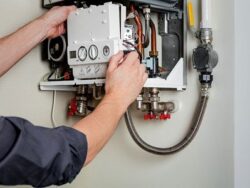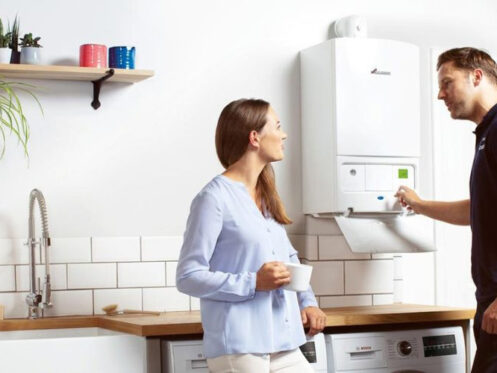Winter Is Coming! Get The Boiler Ready
Make the Most of Home Heat with a Boiler Heating System
The boiler is a common heating system seen in older buildings, but it still has relevance as a modern heating technology due to its efficiency and simplicity. Boilers may seem old-fashioned, but they have gotten many modern upgrades that make them worth a look for homeowners thinking of replacing an older system. They dovetail well with HVAC systems, and the system’s pipes can be placed within the walls for efficient, radiant heat.
Boilers 101

Again, the boiler as a heater is far from new. It comprises a heating element, a water tank, and a series of pipes or tubes that allow steam to reach and heat the home. In many older systems, these nexus points for steam and heat were radiators, which is still the case in some places.
Recently, however, using tubing systems underneath floors or along baseboards is becoming a more common practice. Boilers can use electricity, natural gas, or oil as fuel to heat the water that travels through the closed system of pipes throughout the home. This can be an excellent system for those who suffer from chronic lung disease due to the heat coming from a closed system and no air movement or stirring up of dust.
Breaking Boilers: Common Issues and Warning Signs
Boilers can last a very long time because they have fewer and less complex parts than many other heating systems. Unfortunately, they are not immune to malfunctioning or wear and tear. Any appliance or machine in the home will need some sort of maintenance, repair, or replacement, and the boiler system is no exception. Below there are several warning signs and descriptions that accompany them. If a homeowner is experiencing any of these problems with their boiler, they should inquire with a professional.
- Leaking: If a boiler leaks water, that is a sure sign of a problem. It may be an issue with a pipe break or a problem with the condensate. Either way, one should investigate the problem quickly to prevent water damage.
- Banging: The boiler making a banging noise may need its burner cleaned or the ignitor replaced. This banging can be a warning that the gas is not lighting as quickly as it should, and it may be causing a small gas explosion. Even electrical boilers may bang if there is a problem with seals or insulation.
- Kettling: Ketting consists of popping, whistling, or rumbling noises that may result from hard water scale in the pipes. This may be an issue if the boiler doubles as a home water heater and heating.
- Not Heating: This can result from a problem with the heat exchanger, or it could be that water pressure is too low due to a leak. This particular problem can have several causes, but it does not guarantee that boiler replacement will be needed. Repair may be an option depending on the problem.
Tips for Boiler Maintenance
A trained professional should do boiler repair and other boiler services, such as maintenance. The boiler may be a deceptively simple system, but that does not mean a homeowner should attempt DIY. They should schedule an appointment for maintenance before the boiler is turned on and when it is ready to be turned off approximately every six months.

- Descale the water tank
- Check water levels
- Check for leaks
- Check pipe connections
- Clean burner or heating element
About Anderson Heating, Cooling, Plumbing & Electric
Anderson Heating, Cooling, Plumbing & Electric services Mentor, OH and the surrounding areas. They pride themselves on their indoor air quality expertise and are ready to help with asthma and allergies. Call them today for boiler services and other HVAC needs.


